时态(一般将来时)
一般将来时态
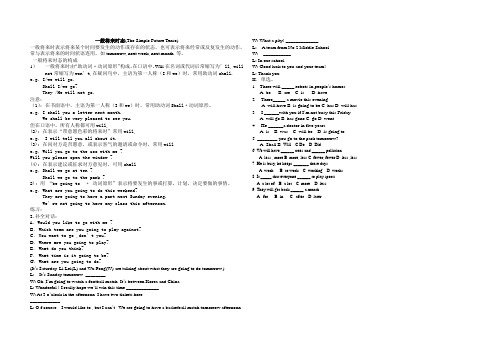
一般将来时态(The Simple Future Tense)一般将来时表示将来某个时间要发生的动作或存在的状态,也可表示将来经常或反复发生的动作,常与表示将来的时间状语连用,如tomorrow, next week, next month 等。
一般将来时态的构成1)一般将来时由“助动词﹢动词原形”构成。
在口语中,Will在名词或代词后常缩写为’ll, will not常缩写为won’t,在疑问句中,主语为第一人称(I和we)时,常用助动词shall.e.g. I/we will go.Shall I/we go?They /He will not go.注意:(1):在书面语中,主语为第一人称(I和we)时,常用助动词Shall﹢动词原形。
e.g.I shall you a letter next month.We shall be very pleased to see you.但在口语中,所有人称都可用will,(2): 在表示“带意愿色彩的将来时”常用will,e.g. I will tell you all about it.(3): 在问对方是否愿意,或表示客气的邀请或命令时,常用wille.g. Will you go to the zoo with me ?Will you please open the window ?(4): 在表示建议或征求对方意见时,可用shalle.g. Shall we go at ten ?Shall we go to the park ?2): 用“be going to ﹢动词原形”表示将要发生的事或打算,计划,决定要做的事情。
e.g.What are you going to do this weekend?They are going to have a part next Sunday evening.We’re not going to have any class this afternoon.练习:I.补全对话:A.Would you like to go with me ?B.W hich team are you going to play against?C.Y ou want to go ,don’t you?D.Where are you going to play?E.What do you think?F.What time is it going to be?G.What are you going to do?(It’s Saturday. Li Lei(L) and Wu Peng(W) are talking about what they are going to do tomorrow.)L: It’s Sunday tomorrow .________W: Oh ,I’m going to watch a football match. It’s between Korea and China.L: Wonderful ! I really hope we’ll win this time._____________W: At 3 o’clock in the afternoon. I have two tickets here.____________L: O f course I would like to , but I can’t . We are going to have a basketball match tomorrow afternoon. W: What a pity! _____________L: A team from No.2 Middle School.W: ___________L: In our school.W: Good luck to you and your team!L: Thank you.II.单选。
一般将来时态
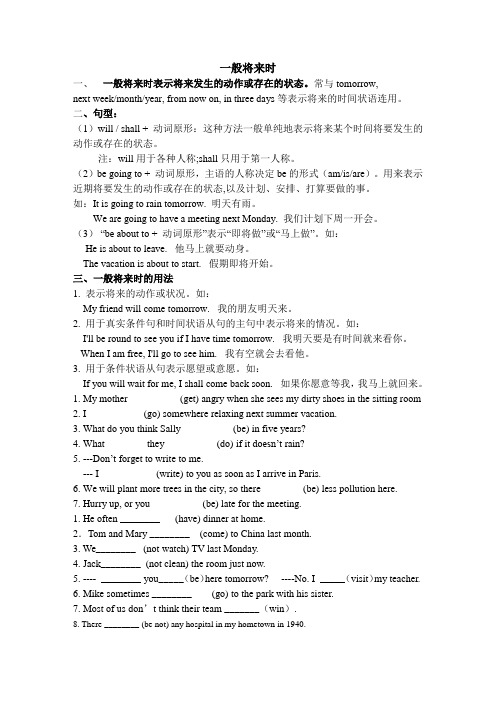
一般将来时一、一般将来时表示将来发生的动作或存在的状态。
常与tomorrow,next week/month/year, from now on, in three days等表示将来的时间状语连用。
二、句型:(1)will / shall + 动词原形:这种方法一般单纯地表示将来某个时间将要发生的动作或存在的状态。
注:will用于各种人称;shall只用于第一人称。
(2)be going to + 动词原形,主语的人称决定be的形式(am/is/are)。
用来表示近期将要发生的动作或存在的状态,以及计划、安排、打算要做的事。
如:It is going to rain tomorrow. 明天有雨。
We are going to have a meeting next Monday. 我们计划下周一开会。
(3)“be about to + 动词原形”表示“即将做”或“马上做”。
如:He is about to leave. 他马上就要动身。
The vacation is about to start. 假期即将开始。
三、一般将来时的用法1. 表示将来的动作或状况。
如:My friend will come tomorrow. 我的朋友明天来。
2. 用于真实条件句和时间状语从句的主句中表示将来的情况。
如:I'll be round to see you if I have time tomorrow. 我明天要是有时间就来看你。
When I am free, I'll go to see him. 我有空就会去看他。
3. 用于条件状语从句表示愿望或意愿。
如:If you will wait for me, I shall come back soon. 如果你愿意等我,我马上就回来。
1. My mother __________(get) angry when she sees my dirty shoes in the sitting room2. I ___________(go) somewhere relaxing next summer vacation.3. What do you think Sally __________(be) in five years?4. What ________they __________(do) if it doesn’t rain?5. ---Don’t forget to write to me.--- I ___________(write) to you as soon as I arrive in Paris.6. We will plant more trees in the city, so there ________(be) less pollution here.7. Hurry up, or you __________(be) late for the meeting.1. He often ________ (have) dinner at home.2.Tom and Mary ________ (come) to China last month.3. We________ (not watch) TV last Monday.4. Jack________ (not clean) the room just now.5. ---- ________ you_____(be)here tomorrow? ----No. I _____(visit)my teacher.6. Mike sometimes ________ (go) to the park with his sister.7. Most of us don’t think their team _______(win).8. There ________ (be not) any hospital in my hometown in 1940.。
英语时态之一般将来时(练习题及答案)

英语时态之一般将来时一、什么是时态时态就是表示一个动作发生的时间和所处的状态。
“时”就是这个动作发生的“时间”;“态”就是这个动作在某个时刻的“状态”。
二、时间的定义英语中把时间分为三类,即:过去现在将来三、状态的定义状态指的是在某个时刻这个动作所处于的状态。
动词共有四类状态,分别为:一般式、进行式、完成式和进行完成式。
1.一般式表示经常发生的动作,其动词形式为do例:I often get up at 7.我经常在七点钟起床。
2.进行式表示正在进行的动作,其动词形式为“be动词+ doing”例:She is singing a French song.她正在唱一首法语歌。
3.完成式表示对“之前发生动作”的一个总结,其动词形式为“have + done”例:They have found the missing child.他们找到那个失踪的孩子了。
4.完成进行式表示对“正在进行动作”的一个总结,其动词形式“have + been + doing”例:I have been reading books for two hours.我已经连续读书两个小时了。
四.一般将来时(will do):一般将来时表示某个将来的时间发生的动作或存在的状态。
1.在表示预测时,在一般将来时态中will和be going to的区别:(1).用be going to 特别指根据目前的明显迹象来推断某件事将要发生;而will则只是表明说话人认为或相信某件事将要发生。
(2).be going to 通常用来表示说话人预期所说的事件马上或在相当近的将来就要发生;而will 所表示的动作发生的时间可近可远。
2.在表示意愿时,在一般将来时态中will和be going to 的区别:(1)be going to 表示说话人对未来行动的计划或打算,通常是经过事先考虑并含有已经为这一行动做了某些准备的意思。
(2)will表示在说话的时刻立即做出决定将去做某事,事先并没有经过考虑,更没有为这一活动做出事先的准备。
一般将来时态

this evening
What is the mouse going to do this evening? It is going to do its homework.
will
What is she going to do? She’s going to shop/ go shopping...
They are going to dance.
will
What are they going to do this evening? They are going to watch TV.
will
句式的变化规则:
1.变否定句—---在be/will后加not 。 2.变一般疑问句------将be/will动词提前。 (主语是第一人称I 时,变一般疑问句 时将I 变you) 3.特殊疑问句(也就是对划线部分提问) -----要用特殊疑问词what +一般疑问句。
表示“不肯”、“不能”等: e.g. We asked her to be the director but she won’t agree. Oil and water won’t mix. The car won’t start.
可表示未来情况的还有:
be going to 结构 现在进行时 一般现在时 be about to 结构 be + 不定式结构
系动词am,is,are的原形都是 。 例如: 系动词 , , 的原形都是be。 例如: 的原形都是 People will have robots in their home. 人们的家中将会有机器人。 人们的家中将会有机器人。 There will be one country in the world. 世界上将会只有一个国家。 世界上将会只有一个国家。 shall适用于第一人称 ,We;而will适用于所有人称。 适用于第一人称I, ; 适用于所有人称。 适用于第一人称 适用于所有人称 通常可以用will来代替 来代替shall。 通常可以用 来代替 。 will,shall均可缩写为:'ll,如: 均可缩写为: , , 均可缩写为 I will= I'll; ; she will = she’ll;will not 和shall not分别可以 ; 分别可以 缩写为 won't 和shan't。 。
一般将来时态

表示按计划、安排即将发生的动作。
例: 你假期打算做什么?
What are you doing for vacation? 我打算去野营。
I’m going camping.
(2) be will move to Shanghai tomorrow. I won’t move to Shanghai tomorrow. Will you move to Shanghai tomorrow? Yes, I will. / No, I won’t. Where will you move to tomorrow?
变否定句、一般疑问句及简略回答,再对划线部分提问。
1. I am going skateboarding tomorrow. I am not going skateboarding tomorrow. Are you going skateboarding tomorrow? Yes, I am. / No, I’m not. What are you doing tomorrow?
1.用法:①表示将来某个时间将要发生的动作或存 在的状态。常与表示将来的时间状语连用。
例:我下周会来看望你。I will visit you next week.
在一百年以后人们会使用钱吗?
Will people use money in 100 years?
明天学校有一场音乐会。(there be)
will适用于各种人称,可以跟人称代词缩写: I will= I’ll she will= she’ll he will= he’ll
英语时态—一般将来时

英语时态—一般将来时(The future indefinite tense)讲解与练习参考答案在英语中,每句话都包含一定的时态,要学好英语就必须掌握英语中一些常用的时态。
在英语中,不同时间发生的动作和情况,要用不同的动词形式表示.这种不同的时间和不同的动词形式就叫做动词的时态. 换句话说,判断一个句子的时态,可以通过句子中的时间和动词的形态来判断。
下面我就一般将来时作一些讲解,如有不妥之处,请指教。
每种时态都有三个最基本的要素,分别是该时态的概念、结构、判断标志词。
一、一般将来时的概念:一般将来时表示将来某一时刻的动作或状态,或将来某一段时间内经常的动作或状态。
二、一般将来时的结构:(有两类不同的结构)Ⅰ主语+shall(在英式英语中,只用于第一人称)/ will(在英式英语中,用于第二、三人称) +动词(原形)【美式英语则不管什么人称,一律用will,因此美式英语只有一种结构:主语+ will+动词(原形)】肯定句式:主语+ will + 动词(原形)+ 其它. 【主语+ will = 主语’ll】否定句式:主语+ will + not + 动词(原形)+ 其它. 【will not = won’t】一般疑问句:will + 主语+ 动词(原形)+ 其它?注:英式英语中现在也趋向于所有人称都用will,因此,现在比较少见到I shall或We shall Ⅱ主语+ be going to +动词(原形)+ 其它.肯定句式:主语+ be going to +动词(原形)+ 其它.否定句式:主语+ be + not + going to +动词(原形)+ 其它.一般疑问句:Be + 主语+ going to +动词(原形)+ 其它?注:主语+ be going to + 动词原形‖表示即将发生的或最近打算进行的事。
三、一般将来时的判断标志词tomorrow , the day after tomorrow , next + 时间,in + 一段时间, in + 将来的年代, at once , this afternoon , this evening , soon , in the future , some day , from now on , and so on.四、一般将来时的基本用法1. ①表示将来发生的行为或存在的状态,常与tomorrow; in 2020;next week(year ,month), from now on,soon, some day, the day aftertomorrow,in(the)future, in five days(再过五天), in two weeks(再过二星期)等表示将来的时间状语连用。
动词时态一般将来时的用法

动词时态一般将来时的用法动词时态包含了多种不同的形式,每种形式都传达了特定的时间信息。
在英语中,一般将来时是用来表达将来发生的动作、事件或状态的。
本文将详细介绍一般将来时的用法,并提供一些例句来帮助读者更好地理解。
一、一般将来时的定义一般将来时是用来表达明确的将来发生的动作或状态。
通常使用的助动词是will或shall,根据主语的不同而定。
二、一般将来时的构成1. 肯定句结构:主语 + will + 动词原形例如:- I will go shopping tomorrow.- He will travel to Europe next week.2. 否定句结构:主语 + will + not + 动词原形,或主语 + won't + 动词原形例如:- She will not visit her grandparents this weekend.- They won't attend the party.3. 疑问句结构:Will + 主语 + 动词原形?例如:- Will you join us for dinner?- Will they arrive on time?三、一般将来时的用法1. 表达自愿或意愿一般将来时常常用来表达主观上的决定、打算或愿望。
例如:- I will help you with your project.- He will volunteer at the local charity organization.2. 表示未来的计划或安排一般将来时可用于描述预定的时间表或安排。
例如:- We will have a meeting at 9am tomorrow.- They will arrive at the airport in the evening.3. 表示预测或推测有时,我们可以根据现有的证据或情况,使用一般将来时来推测未来可能发生的事情。
掌握时态一般将来时和过去将来时

掌握时态一般将来时和过去将来时一般将来时和过去将来时是英语中常用的两种时态形式,它们帮助我们描述将来发生的动作或事件,同时强调时间的关系。
在本文中,我们将重点探讨这两种时态的用法和相应的例句。
一、一般将来时(Simple Future Tense)一般将来时用来表达将来某个时间发生的动作或事件。
我们可以使用以下几种结构来构成一般将来时:1. 使用“will + 动词原形”构成句子,表示决定或预测的未来动作或事件。
例如:- I will visit my grandparents this weekend.(我会在这个周末去拜访我的祖父母。
)- He will be a doctor when he grows up.(他长大后会成为一名医生。
)2. 使用“be going to + 动词原形”表示计划、意愿或打算去做某事。
例如:- I am going to study abroad next year.(明年我打算出国留学。
)- She is going to have a party on Friday.(她打算在周五举办一个派对。
)3. 使用“shall + 动词原形”构成句子,表示“我将”,主要用于“我们”(“we”)和“我”(“I”)。
例如:- We shall meet at the park tomorrow.(明天我们将在公园见面。
)- Shall I help you with the bags?(我应该帮你拿行李吗?)二、过去将来时(Future in the Past Tense)过去将来时用于描述在过去某个时间点将来会发生的动作或事件。
我们可以使用以下结构来构成过去将来时:1. 使用“would + 动词原形”构成句子,表示过去某个时间点的将来动作。
例如:- He said he would come to the party.(他说他会来参加派对。
)- She told me she would give me a call later.(她告诉我她稍后会给我打电话。
“一般将来时”的几种语法形式[整理版]
![“一般将来时”的几种语法形式[整理版]](https://img.taocdn.com/s3/m/6c03bef44bfe04a1b0717fd5360cba1aa8118c39.png)
“一般将来时”的几种语法形式一般将来时的语法形式主要有四种:shall / will +动词原形;be going to +动词原形;现在进行时和一般现在时。
现将这四种形式分述如下:一、shall / will +动词原形1. will可用于所有人称,但shall 仅表示单纯将来时,用于第一人称I和we,作为will的一种替代形式。
以Y ou and I为主语时通常避免用shall。
例如:He will be back soon. 他很快就会回来。
I shall/will be free on Sunday. 星期天我有空。
Y ou and I will work in the same factory. 你和我将在同一工厂工作。
2. will, shall可用来预言将来发生的事。
如说出我们设想会发生的事,或者请对方预言将要发生什么事。
例如:It will rain tomorrow. 明天将要下雨。
3. will, shall除可表示单纯的将来时以外,还可以带有意愿的色彩,仍指的是将来。
例如:I’ll buy you a bicycle for your birthday. 你过生日时,我给你买一辆自行车。
(表示允诺) Will you open the door for me please? 请你帮我开门好吗?(表示请求)Shall I get your coat for you? 我可以为你拿外套吗?(表示提议)二、be going to +动词原形1. 表示说话人根据现在已有的迹象,判断将要或即将发生某种情况。
这类句子的主语可以是人,也可是物。
例如:There is going to be a football match in our school tomorrow afternoon. 明天下午我们学校将有一场足球赛。
(已有告示)I feel terrible. I think I’m going to die. 我感到难受极了,我想我快不行了。
英语动词时态用法归纳:一般将来时

英语动词时态用法归纳:一般将来时一、一般将来时的构成一般将来时的由s hall / will+ 动词原形构成。
二、一般将来时的基本用法(1) 表示单纯的将要发生的动作或情况。
常与表示将来的时间状语连用。
如:Tomorrow will be Sunday. 明天是星期天。
They say that it will rain. 他们说要下雨。
I’ll be thirty-seven on my next birthday. 到下次生日,我就三十七岁了。
We won’t be free tonight. 今晚我们没空。
(2) 也可以表示临时决定要做的事。
如:—I thought I asked you to sweep the floor.—O h, I’m sorry. Mother, I will do it right now.—我原以为我让你扫地了。
—噢,对不起,妈妈,我就做。
—You have left the door open.—O h, so I have. I’ll go and lock it.—你忘了锁门。
—哦,是的。
我就去。
(3) 有时虽没有时间状语,但从意思上可以判断指将来的动作。
如:Who will take the chair? 谁当主席?You will pass the examination. 你会通过那个考试的。
The meeting won’t last long. 会开不了多久。
(4) 一般将来时有时还表示倾向和习惯性。
如:Oil will float on water. 油总浮在水面上。
Fish will die without water。
鱼离开水就会死掉。
The machine won't work because of a faulty connection. 机器电源线接错了,所以开不动。
三、表示将来时的几种方法(1) be going to+动词原形。
英语时态:一般将来时

英语时态:一般将来时一般将来时(simple future tense)表示将来某一时段的动作或状态,或将来某一段时间内经常的动作或状态。
一般将来时常常和表示将来的时间状语连用。
如:tomorrow, next week, in the future, in a year等。
Ⅰ. 句法结构【仅讨论陈述句和疑问句两种语式】:1.陈述句:A. 肯定形式:主语+be going to /will/shall +动词原形+其他B. 否定形式:主语+be not going to /will not/shall not+动词原形+其他注:a. 在直接在助动词后加not。
b. be going to结构中的be仅指am, is, are三个be动词。
c. will/shall+动原结构在谓语两态变化中无人称和数的变化。
d. 一般情况下,仅表示时态时,shall用于第一人称,will用于第二、三人称;表示说话人强烈意愿和语气时则用法相反。
2.疑问句:A. 一般疑问句:助动词提前即可①Be动词+主语+ going to +动词原形+其他②Will/Shall+主语+动词原形+其他B.特殊疑问句:特殊疑问词+一般疑问句(同上)3.被动语态:主语+ 助动词(结构) + be +动词过去分词【被动结构be done,时体现在助动词】➢两态变化例句参考下表(以will为例):Ⅰ. 主要用法及结构:1.【一般将来时表将来】一般将来时表示将要发生的动作或情况。
A.will/shall +动原I will(shall) arrive tomorrow.Will you be free tonight?B.be going to+动原a.表示计划、打算、准备做的事。
We are going to put up a building here.b.表示即将发生或肯定要发生的事。
I think it is going to snow.注:在一般将来时的句子中,有时有表示将来时间的状语,有时没有时间状语,这时要从意思上判断是否指未来的动作或情况。
(完整版)一般将来时时态用法讲解
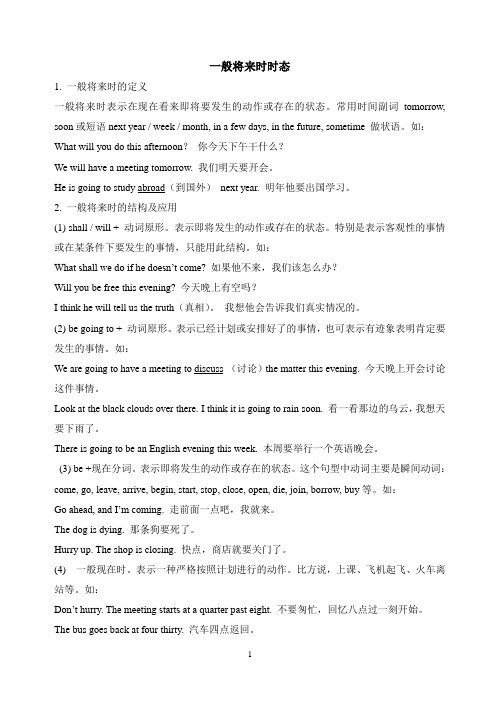
一般将来时时态1. 一般将来时的定义一般将来时表示在现在看来即将要发生的动作或存在的状态。
常用时间副词tomorrow, soon或短语next year / week / month, in a few days, in the future, sometime 做状语。
如:What will you do this afternoon?你今天下午干什么?We will have a meeting tomorrow. 我们明天要开会。
He is going to study abroad(到国外)next year. 明年他要出国学习。
2. 一般将来时的结构及应用(1) shall / will + 动词原形。
表示即将发生的动作或存在的状态。
特别是表示客观性的事情或在某条件下要发生的事情,只能用此结构。
如:What shall we do if he doesn’t come? 如果他不来,我们该怎么办?Will you be free this evening? 今天晚上有空吗?I think he will tell us the truth(真相)。
我想他会告诉我们真实情况的。
(2) be going to + 动词原形。
表示已经计划或安排好了的事情,也可表示有迹象表明肯定要发生的事情。
如:We are going to have a meeting to discuss (讨论)the matter this evening. 今天晚上开会讨论这件事情。
Look at the black clouds over there. I think it is going to rain soon. 看一看那边的乌云,我想天要下雨了。
There is going to be an English evening this week. 本周要举行一个英语晚会。
(3) be +现在分词。
表示即将发生的动作或存在的状态。
16种英语时态 一般将来时

16种英语时态一般将来时表示将要发生的动作或存在的状态及打算,计划或准备做1.时间状语:tomorrow.next day.soon.in a few minutes.by·the day after tomorrow2.基本结构:主+am/is./are+going to +do,will/shall+do否定式:am/is/are+not going to+do, will/shall+not do一般疑问句:be+·will/shall+·3.基本用法:[1]a.表示将来时间的动作或状况Eg:they are going to have a competition with us in studies.B.用于真实条件句和时间状语从句的主句中表示将来的情况Eg:i’ll tell you as soon as he comesC.用于条件状语从句表示愿望或意愿Eg:if you will wait for me,i shall come back soonD.表示一种倾向或习惯性动作Eg:the shop won’t openn until nine.[2]a.be going to+v原(表示打算或准备好要做的事或有迹象表明要发生的事情)Eg:what are you going to do during the summer holidayB.be+v-ing 有些v的现在进行时表示将要发生的动作,表示按计划或安排即将发生的事情,如:go come leave start arrive Eg:jenny is coming to supper this evening.C.be to +v原表示约定命令或按计划要做的事情D.be about to +v原表示将要马上Eg:he is about toleave附加:1.be going to ---- be toBe to 表示客观安排或受人指示而做某事Eg:i am to play football tomorrowBe going to 表示主观的打算或计划Eg:i am going to play football tomorrow2.be going to ---- will用于条件句时,be going to 表将来will表意愿eg:if you are going to make a journey,you’d better get ready for it as soon as possibleNow if you will take off your clothes,we will fit the new clothes on you in front of the mirror.。
一般将来时总结
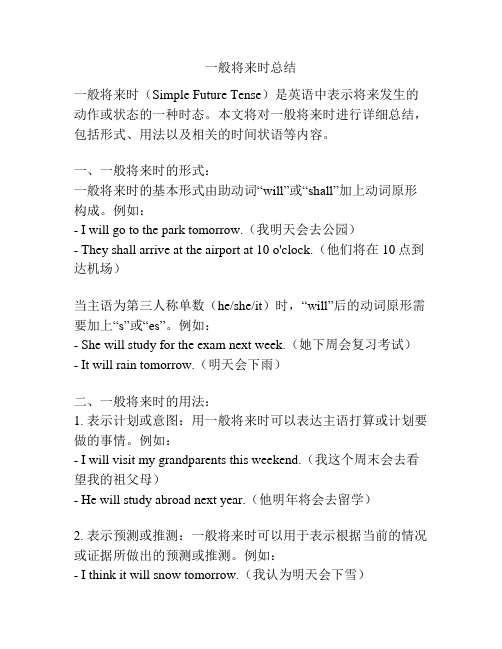
一般将来时总结一般将来时(Simple Future Tense)是英语中表示将来发生的动作或状态的一种时态。
本文将对一般将来时进行详细总结,包括形式、用法以及相关的时间状语等内容。
一、一般将来时的形式:一般将来时的基本形式由助动词“will”或“shall”加上动词原形构成。
例如:- I will go to the park tomorrow.(我明天会去公园)- They shall arrive at the airport at 10 o'clock.(他们将在10点到达机场)当主语为第三人称单数(he/she/it)时,“will”后的动词原形需要加上“s”或“es”。
例如:- She will study for the exam next week.(她下周会复习考试)- It will rain tomorrow.(明天会下雨)二、一般将来时的用法:1. 表示计划或意图:用一般将来时可以表达主语打算或计划要做的事情。
例如:- I will visit my grandparents this weekend.(我这个周末会去看望我的祖父母)- He will study abroad next year.(他明年将会去留学)2. 表示预测或推测:一般将来时可以用于表示根据当前的情况或证据所做出的预测或推测。
例如:- I think it will snow tomorrow.(我认为明天会下雪)- They believe she will win the competition.(他们相信她会赢得比赛)3. 表示意愿或允诺:一般将来时可以表达主语的意愿或承诺要做某事。
例如:- I will help you with your homework.(我会帮你做作业)- He will stop smoking.(他将戒烟)4. 表示预定的事件或安排的计划:一般将来时可以用于表示已经安排好的事件或计划。
一般将来时态的结构和用法
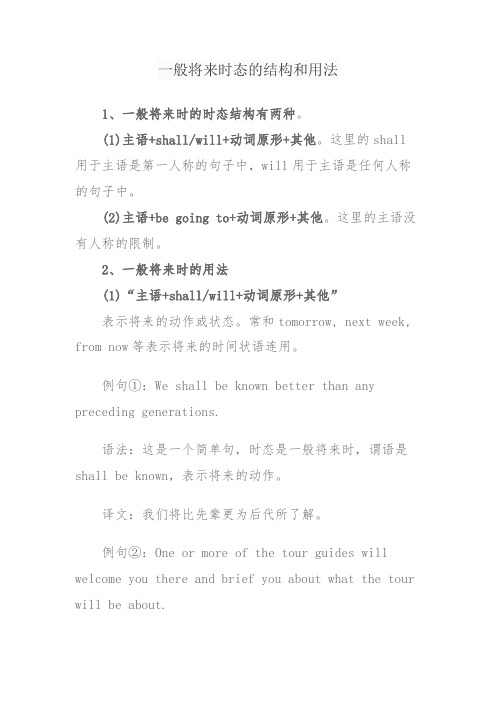
一般将来时态的结构和用法1、一般将来时的时态结构有两种。
(1)主语+shall/will+动词原形+其他。
这里的shall 用于主语是第一人称的句子中,will用于主语是任何人称的句子中。
(2)主语+be going to+动词原形+其他。
这里的主语没有人称的限制。
2、一般将来时的用法(1)“主语+shall/will+动词原形+其他”表示将来的动作或状态。
常和tomorrow, next week, from now等表示将来的时间状语连用。
例句①:We shall be known better than any preceding generations.语法:这是一个简单句,时态是一般将来时,谓语是shall be known,表示将来的动作。
译文:我们将比先辈更为后代所了解。
例句②:One or more of the tour guides will welcome you there and brief you about what the tour will be about.语法:这是一个主从复合句。
what引导的是宾语从句;主句和从句的时态都是一般将来时,谓语分别是will welcome…and brief和will be,表示将来的动作。
译文:有一个或几个导游会到那里迎接你们,并且向你们简要介绍参观的内容。
(2)“be going to+动词原形+其他”表示事先考虑过的将要发生的动作以及已有迹象表明必将要发生的某事,意为“打算,就要”。
例句:Now we go to Jane who is going to tell us about what's happening in town this weekend.语法:这是一个多重主从复合句。
who引导的是定语从句,该从句的时态是一般将来时,谓语是is going to tell;该定语从句中又包含一个由what引导的宾语从句,作介词about的宾语。
一般将来时动词变化规则

一般将来时动词变化规则一般将来时是英语中用来表示将来发生的动作或存在的状态的时态。
在一般将来时中,动词的变化规则如下:1. 一般动词在一般将来时中,一般动词的变化规则如下:主语 + will + 动词原形例如:- I will go to the park tomorrow.- They will buy a new car next month.2. 助动词 do在一般将来时中,助动词 do 的变化规则如下:主语 + will + do + 动词原形例如:- He will do his homework later.- We will do the cleaning tomorrow.3. 助动词 be在一般将来时中,助动词 be 的变化规则如下:主语 + will + be + 动词-ing 形式例如:- She will be studying abroad next year.- They will be working on a new project.4. 特殊情况在一般将来时中,有一些动词的变化规则略有不同:- can → will be able to- may → will be allowed to- must → will have to- should → will be supposed to例如:- He will be able to swim next summer.- She will be allowed to go to the party.- They will have to finish the report by tomorrow.- We will be supposed to arrive on time.总结一般将来时是英语中表示将来动作或状态的时态,动词的变化规则包括使用助动词 will,助动词 do或助动词 be,以及特殊情况下的变化规则。
一般将来时知识点总结
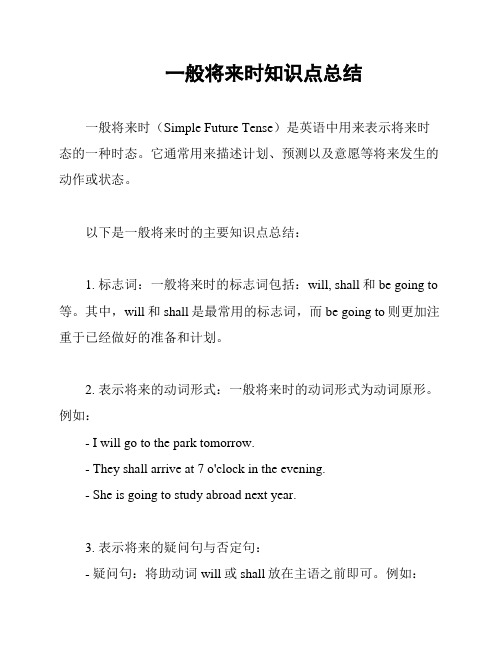
一般将来时知识点总结一般将来时(Simple Future Tense)是英语中用来表示将来时态的一种时态。
它通常用来描述计划、预测以及意愿等将来发生的动作或状态。
以下是一般将来时的主要知识点总结:1. 标志词:一般将来时的标志词包括:will, shall和be going to 等。
其中,will和shall是最常用的标志词,而be going to则更加注重于已经做好的准备和计划。
2. 表示将来的动词形式:一般将来时的动词形式为动词原形。
例如:- I will go to the park tomorrow.- They shall arrive at 7 o'clock in the evening.- She is going to study abroad next year.3. 表示将来的疑问句与否定句:- 疑问句:将助动词will或shall放在主语之前即可。
例如:- Shall we start the meeting now?- 否定句:在will或shall后面加上not即可。
例如:- I will not forget your birthday.- They shall not pass the exam.4. 表示将来的时间状语:- 一般将来时通常与一些表示将来的时间状语连用,例如:tomorrow, next week, in the future等。
例如:- She will visit her parents tomorrow.- I am going to travel abroad next month.总结:一般将来时是用来表达将来发生的动作或状态的时态。
通过掌握标志词、动词形式、疑问句与否定句以及时间状语等知识点,我们可以更加准确地使用一般将来时来表达自己的意思。
一般将来时定义,结构,标志词,用法,变化规则
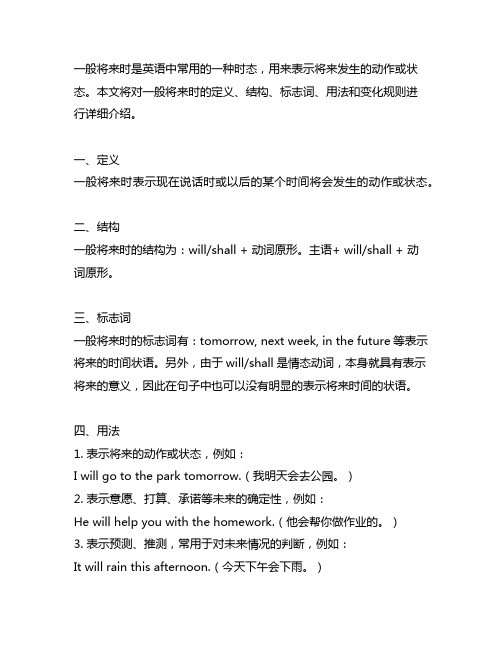
一般将来时是英语中常用的一种时态,用来表示将来发生的动作或状态。
本文将对一般将来时的定义、结构、标志词、用法和变化规则进行详细介绍。
一、定义一般将来时表示现在说话时或以后的某个时间将会发生的动作或状态。
二、结构一般将来时的结构为:will/shall + 动词原形。
主语+ will/shall + 动词原形。
三、标志词一般将来时的标志词有:tomorrow, next week, in the future等表示将来的时间状语。
另外,由于will/shall是情态动词,本身就具有表示将来的意义,因此在句子中也可以没有明显的表示将来时间的状语。
四、用法1. 表示将来的动作或状态,例如:I will go to the park tomorrow.(我明天会去公园。
)2. 表示意愿、打算、承诺等未来的确定性,例如:He will help you with the homework.(他会帮你做作业的。
)3. 表示预测、推测,常用于对未来情况的判断,例如:It will rain this afternoon.(今天下午会下雨。
)五、变化规则1. 肯定句的一般将来时结构为:will/shall + 动词原形。
例如:She wille to see me tomorrow.(她明天会来看我。
)2. 否定句的一般将来时结构为:will/shall + not + 动词原形。
例如:I will not go to the party tonight.(我今晚不会去参加派对。
)3. 疑问句的一般将来时结构为:will/shall + 主语+ 动词原形。
例如:Will youe to the meeting tomorrow?(你明天会来参加会议吗?)以上就是关于一般将来时的定义、结构、标志词、用法和变化规则的详细介绍。
希望对您有所帮助。
一般将来时是英语中最常用的一种时态之一,用于表示将来会发生的动作或状态。
动词时态一般将来时

1、I am going to do my homework tonight. 我打算今天晚上做作业。 注:do前的my省略后句子仍正确,但是不省更地道。 2、Lily is going to sing and dance with Jack. Lily想要与Jack一起唱歌、跳舞。 3、Lily is going to go to Beijing with Jack. Lily打算与Jack一起去北京。 注:此句中有两个go to,为使句子简洁明了,省略句中表 示动作的一个保留时态的一个。因此上句改为: Lily is going to Beijing with Jack. 1、His father is about to go to H.K. by plane. 他交亲马上要坐飞机去香港。 注:by plane=by air 坐飞机 1、This meeting is to begin at 3:00 this afternoon. 这个会议将在今天下午3:00开始。 2、This train is to leave at 5:00. 这趟火车将在5:00离开。 1、I shall go to Beijing. 我将要去北京。(不知愿不愿意) 2、I will go to Beijing. 我愿意去北京。 注:通常shall用与 I 或 we ,而will用与 I、we之外的动 作发出者中。 3、I shall be a teacher. 我将成为一名教师。 4、She will be a beautiful. 我将变漂亮。 1、Flowers will die without water . 没有水花儿会死的。 1、I am coming . 我就来。 2、The old man is dying . 这个老人快要死了。 注:瞬间动词有:come go leave die begin
- 1、下载文档前请自行甄别文档内容的完整性,平台不提供额外的编辑、内容补充、找答案等附加服务。
- 2、"仅部分预览"的文档,不可在线预览部分如存在完整性等问题,可反馈申请退款(可完整预览的文档不适用该条件!)。
- 3、如文档侵犯您的权益,请联系客服反馈,我们会尽快为您处理(人工客服工作时间:9:00-18:30)。
一般将来时讲解及练习1、定义:一般将来时表示将来某个时间要发生的动作或存在的状态、2、一般将来时的结构:主语+will\shall\be going to+v(动词原形)+其他例如:It is going to rain. 要下雨了。
We are going to have a meeting today. 今天我们准备开一个会。
Tomorrow will be Sunday. 明天就是星期天。
The rain will stop soon. 雨很快就要停了。
I shall not go. 我不准备去了。
What shall we do for summer holiday?暑假我们做什么呢?注意:(1)will用于所有人称,shall用于第一人称(we.I)(2)will 常简略为'll,并与主语连写在一起,如:I'll,he'll,it'll,we'll,you'll,they'll。
(3)一般疑问句如用will you…?其简略答语须是Yes,I will或No,I won't;3、一般将来时的时间标志:常常和表示将来的时间状语连用。
如:tomorrow(明天),next week(下周),from now no(从现在开始),in the future(将来),soon, in 2015, in two days(两天之后)等。
4、一般将来时的四种句式:(1)主语+be going to +动词原形①肯定句主语+be(am /,is,/ are) going to +动词原形+其它My sister is going to learn English next year. 我姐姐准备明年学英语。
②否定句主语+be(am / is / are)not going to +动词原形+其它I am not going to(go to)the cinema tonight. 我今天晚上不打算去看电影。
③一般疑问句Be (am / is / are)+主语+going to+动词原型+其它?Is your father going to play basketball with you ?No , he isn’t。
你父亲打算和你去打篮球吗?不。
④特殊疑问句特殊疑问词(Wh-)+一般疑问句?Where are you going to spend Spring Fesital.? 春节你打算在哪过?(2)主语+will /shall +动词原形(在书面语中,主语是第一人称I,We时,常用shall)①肯定句主语+will/shall+动词原形+其它I (shall) write to him next week. 下周我将给他写信。
②否定句主语+ will /shall+ not + 动词原形+其它They won’t watch TV this evening。
今天晚上他们不看电视。
③一般疑问句will/shall+主语+动词原形+其它Will you stay at home with us tomorrow ?明天你和我们呆在家里好吗?④特殊疑问句特殊疑问词(Wh-) +一般疑问句When will your father be back? 你爸爸什么时侯回来?注意:be或will提到句首,some改为any,and改为or,第一二人称互换。
一、填空1.我打算明天和朋友去野炊。
I_____ _______ _________ have a picnic with my friends.I ________ have a picnic with my friends.2.下个星期一你打算去干嘛?我想去打篮球。
What ________ ________ _________ _________ _________ next Monday?I _______ ______ _____ play basketball。
What _________ you do next Monday?I ________ play basketball.3.你妈妈这个周末去购物吗?是,她要去买一些水果。
_____ your mother _______ ________ go shopping this ___________?Yes,she _________. She ______ ________ __________ buy some fruit.4.你们打算什么时候见面。
What time _______ you _________ __________ meet?二、改句子。
1.Nancy is going to go camping.(改否定)Nancy ________ going to go camping.2.I‘ll go and join them.(改否定)I _______ go ______ join them.3.I’m going to get up at 6:30 tomorrow.(改一般疑问句)________ _______ ________ to get up at 6:30 tomorrow?4.We will meet at the bus stop at 10:30.(改一般疑问句)_______ ________ meet at the bus stop at 10:30 ?5.She is going to listen to music after school.(对划线部分提问)________ _______ she ________ ________ _________ after school?6.My father and mother are going to see a play the day after tomorrow.(同上)_________ _________ going to see a play the day after tomorrow.三、用所给词的适当形式填空。
1.Today is a sunny day. We ___________________ (have)a picnic this afternoon.2.My brother _______________ (go)to Shanghai next week.3.Tom often ______________(go)to school on foot.But today is rain. He ______________ (go)to school by bike.4.What do you usually do at weekends?I usually ________ (watch)TV and ________(catch)insects?5.It‘s Friday today. What _____she _________ (do)this weekend?She ______________ (watch)TV and _____________ (catch)insects.6.What ___________ (d0)you do last Sunday?I ____________ (pick)apples on a farm.What ______________ (do)next Sunday?I ______________ (milk)cows.7.Mary ____________ (visit)her grandparents tomorrow.8.Liu Tao ____________ (fly)kites in the playground yesterday.9.David ______________ (give)a puppet show next Monday.10.I ________________ (plan)for my study now.课后练习一、单项选择。
( ) 1. There __________ a meeting tomorrow afternoon.A. will be going toB. will going to beC. is going to beD. will go to be( ) 2. Charlie ________ here next month.A. isn’t workingB. doesn’t workingC. isn’t going to workingD. won’t work( ) 3. He ________ very busy this week, he ________ free next week.A. will be; isB. is; isC. will be; will beD. is; will be( ) 4. There ________ a dolphin show in the zoo tomorrow evening.A. wasB. is going to haveC. will haveD. is going to be( ) 5. –________ you ________ free tomorrow?–No. I ________ free the day after tomorrow.A. Are; going to; willB. Are; going to be; willC. Are; going to; will beD. Are; going to be; will be( ) 6. Mother ________ me a nice present on my next birthday.A. will givesB. will giveC. givesD. give( ) 7. –Shall I buy a cup of tea for you?–________. (不,不要。
)A. No, you won’t.B. No, you aren’t.C. No, please don’t.D. No, please.( ) 8. –Where is the morning paper?–I ________ it for you at once.A. getB. am gettingC. to getD. will get二、动词填空。
1. I ______(leave)in a minute. I ______(finish)all my work before I ______ (leave).2. —How long _____ you _____(study)in our country?—I _____(plan)to be here for about one more year.—I _____(hope)to visit the other parts of your country.—What ______ you ______(do)after you ______(leave)here?—I ______(return)home and ______(get)a job.3. I ______(be)tired. I ______(go)to bed early tonight.4. Mary’s birthday is next Monday, her mother _____(give)her a present.三、句型转换。
